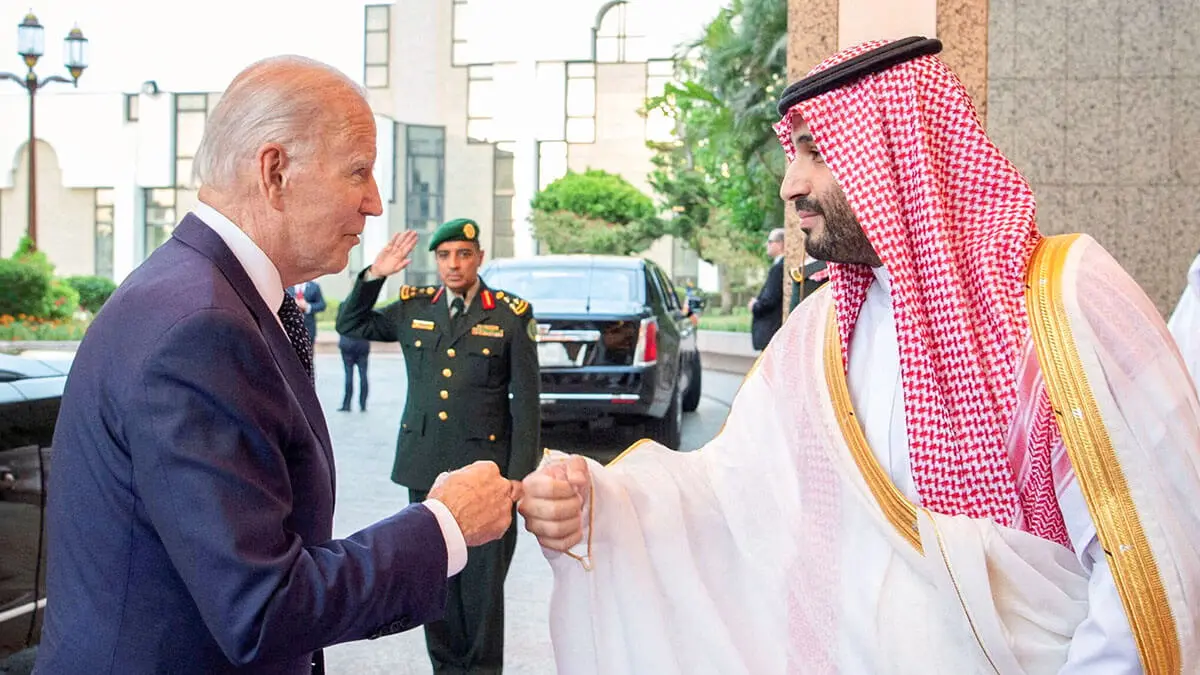Washington’s ad hoc Saudi policy

The US administration has recently announced the reversal of its previous decision to halt the supply of offensive weapons to Saudi Arabia.
The administration of US President Joe Biden has in fact come full circle in its cycle of strategic confusion in the Middle East. It has realised that it cannot ask a strategic ally like Saudi Arabia something and ask for the opposite as well. To be more precise in describing the state of relations between Washington and Riyadh, one can say that the Biden administration has made a number of politically-conflicting requests and expected Saudi Arabia to go along with all of them.
At the start of its term in office, the Biden administration put on display an aggressive attitude towards Saudi Arabia. Beyond the public expression of anger towards Saudi Arabia by Biden and his Democratic administration over the killing of journalist Jamal Khashoggi in the Saudi consulate in Turkey, the real issue was that the Biden administration had carried on with much of Barack Obama’s legacies. Riyadh’s role, from the US Democrats’ point of view, was the main reason why so many the strategic achievements of the Obama era came unstuck. The Democrats seemed to believe the Saudi-led Arab moderate alliance played a decisive role in aborting the comprehensive regime change project in the region during what will become known as the Arab Spring.
In short, the Obama-Biden administration at the time somehow believed in the notion of Muslim Democrats, one similar to the Christian Democrats concept which has marked to a great extent the post-fascist era in Europe. The Obama administration adopted the Muslim Brotherhood project and even promoted it. The rest of the story about the civil wars and other deleterious effects resulting from the so-called Arab Spring is history now. The Biden administration believed Saudi Arabia provided the arguments for Republican President Donald Trump’s cancellation of the nuclear agreement with Iran, the crown jewel of the Obama administration’s achievements and its source of pride. The escalation of hostility with Tehran was blamed on Riyadh, even if the Iranians at the time backed the designs of their Houthi allies in Yemen, including their takeover of the capital, Sana’a, control of the rest of Yemen, north and south, and threatening security and stability of the southern edge of the Arabian Peninsula.
The war in Yemen, from an American point of view, did not begin the day the Houthis entered Sana’a and overthrew the rule of President Abd Rabbou Mansour Hadi, but rather the day the Arab coalition tried to restore the internationally-recognised government to power. Before it stopped its shipments of offensive weapons to Saudi Arabia, Washington had removed the Houthis from the list of terrorist organisations, so as to open the door to future dealing with them. The rise to power of the Houthis in Yemen has produced tangible repercussions culminating in the strategic threat they have come to pose by disrupting international navigation in the Red Sea and the Gulf of Aden.
US escalation against Saudi Arabia would have continued had it not been for the Ukraine war. American strategic “experts” suddenly realised that Saudi oil was more than ever indispensable as the Russians used gas and oil supplies to Europe as a weapon in their showdown the West on Ukraine.
After a period of Saudi reluctance, Biden was forced to visit Saudi Arabia and formally resolve the row with Riyadh with a fist bump with Saudi Crown Prince Mohammed bin Salman replacing the more conventional handshake. Americans realised however the limits of Saudi willingness to meet their demands for greater oil output.
With the de-escalation of tensions following the fist bump, the Biden administration sought more breakthroughs in its relationship with Saudi Arabia. The Saudis had made overtures to China and Russia, reconciled with the Turks and opened a new chapter in their ties with the Iranians. Washington wondered why not promote a Saudi-Israeli peace deal since Riyadh is already seeking to end all its regional conflicts? According to those familiar with the issue, the Saudi-Israeli peace deal had reached an advanced stage, had it not been for the “Al-Aqsa Flood.” Did the Hamas operation and the war in Gaza convince the Saudis that there could be no peace with Israel without the Palestinians? No one knows for sure. But all has changed since the start of the war.
From the first day of the Gaza war crisis, leaders in the region have realised that this war is different from previous conflicts. Iran was not going to miss its chance to turn the showdown into a regional war by exploiting Israel’s military retaliation for the October 7 Hamas attack. Tehran and its allies celebrated the “Al Aqsa Flood” and began to make their presence felt early on, starting with the first missiles launched by Hezbollah at northern Israel. Soon afterwards, all the armed militias loyal to Iran, in Yemen, Iraq and Syria, took part one way or the other in the war. The Houthis launched some conventional drones that fell on Egyptian soil, and then Iran realised that the most sensitive of all is the Bab al-Mandab Strait. The Houthis started their war on global shipping and Western reactions quickly ensued, even if they seemed limited in scope.
Perhaps the most important fact that Iran did not take into consideration when it instructed its loyalist militias to attack Israel is that Operation “Al Aqsa Flood” has completely changed the face of Israel. The Israelis, and not just Binyamin Netanyahu and his extremist government, felt they had paid in advance the price of the war, with the killing of 1,200 Israelis and the capture of hundreds by Hamas.
Israel no longer had anything to fear from the expansion of the war. Iran’s attitude has strategically helped Israel make a decision which it had thus far been postponing, as it made the determination that striking at Hezbollah will cost it less at this stage than if it would a few years from now. The expansion of the regional war was not limited to attacks on Hezbollah as Israel used the Houthi drone strike on Tel Aviv to attack oil facilities and power stations in Hodeidah, Yemen. The United States now has come to realise that Netanyahu, along with his government and a significant number of senior Israeli military officers, will go to the furthest extent in the military confrontation, as illustrated by their assassination of Fuad Shukr in Lebanon and Ismail Haniyeh in Tehran, a few days after the bombing of Hodeidah.
If the Hodeidah strike and the assassination of senior leaders of the Revolutionary Guards, Hezbollah and Hamas do not constitute a regional war, then what is a regional war?
The United States has reassessed its regional policies and realised the Saudi option was still on the table. It needed its Saudi ally and decided to reverse the US decision which had prevented Riyadh from receiving American offensive weapons. No one knows how far Israel will go in its potential response to Iran’s expected retaliation. Countries aligned with the United States could not be left without means of deterrence.
But reassessments do not necessary mean full-fledged policies. The Biden administration has continued to look at Saudi Arabia through a variety of lenses. It first viewed Riyadh through the lens of denouncing the kingdom and smearing its reputation after the Khashoggi incident. Then it looked at Riyadh through the Russia lens when energy supplies seemed at stake. Another time, it looked at it through a China lens when Riyadh was making its overtures to Beijing. It looked at Saudi Arabia from an Israeli perspective when it wanted to complete the process of Israel’s regional integration. Finally, it looked at Riyadh through an Iranian lens as tensions between Tehran and Riyadh de-escalated. But in all instances, the Biden administration never looked at Saudi Arabia through a lens specific to Riyadh and its regional and political priorities. Every time, Washington would come up with ad hoc solutions to deal with issues in the US-Saudi relationship, which is supposed to be strategic and deeply-rooted in history. Most recently, there was the ad hoc move to cancel the decision to halt offensive weapon shipments to Saudi Arabia. This step was taken as a result of regional escalation and not out of consideration for what Riyadh wanted or needed. It was taken without even sitting down to discuss the apprehensions which prompted Riyadh to confront the Houthis.
It is difficult to say if Riyadh itself bears some level of responsibility for pushing the relationship to a point approaching enmity. It certainly failed at the time to predict that the incoming Democratic administration would seek to settle scores with Riyadh, for its close ties to Trump and its role in dismantling the Obama era’s regional legacy. Perhaps Riyadh thought there was bound to be an institutional continuum in the United States and that it was unlikely that any new administration would go as far as undermine historic ties. But when the Biden administration came to the White House, it did not hesitate to quickly show its hostility to Saudi Arabia. The countries of the region, including Saudi Arabia, do not expect the United States to view them the same way it views Israel, where diplomatic bickering and political reprimands do not go beyond words and do not affect basic interests or arms supplies, as shown after the Gaza war. But the lesson from the Biden administration’s wavering and then coming full circle, after less than four years, is an important and necessary lesson to draw. It is a lesson which cannot be forgotten even if “our friend” Trump arrives at the White House.
Haitham El Zobaidi is the Executive Editor of Al Arab Publishing House.


